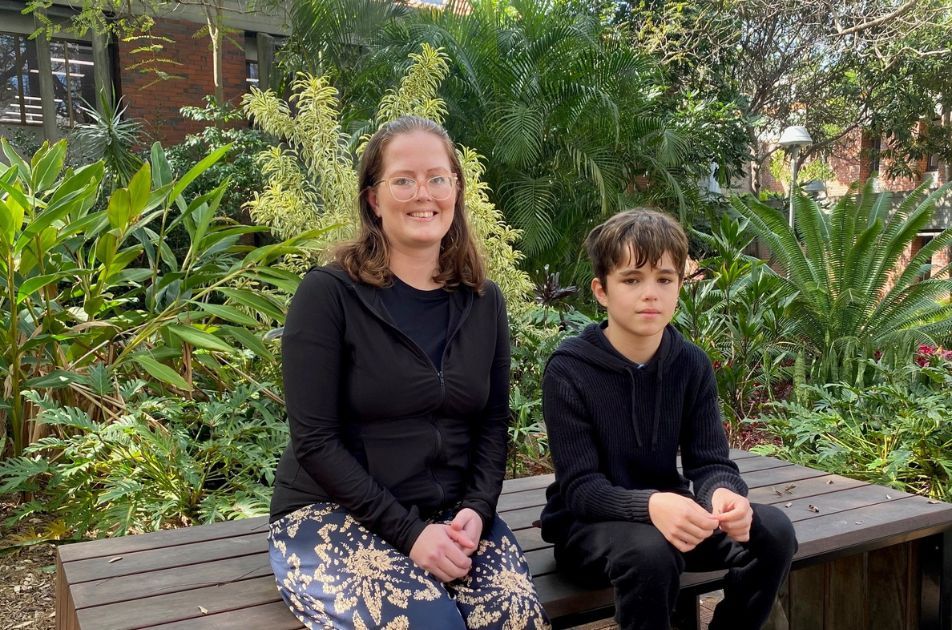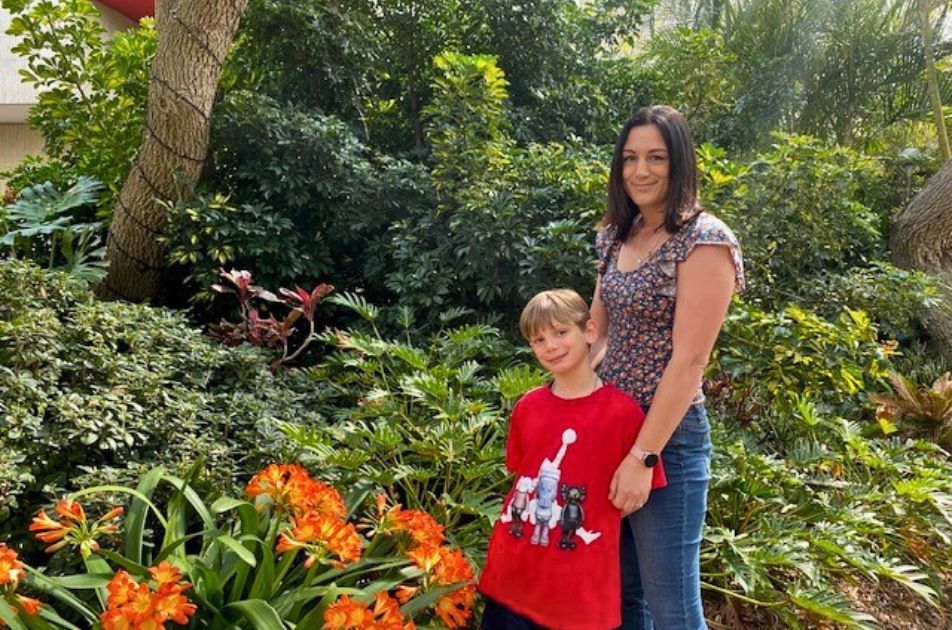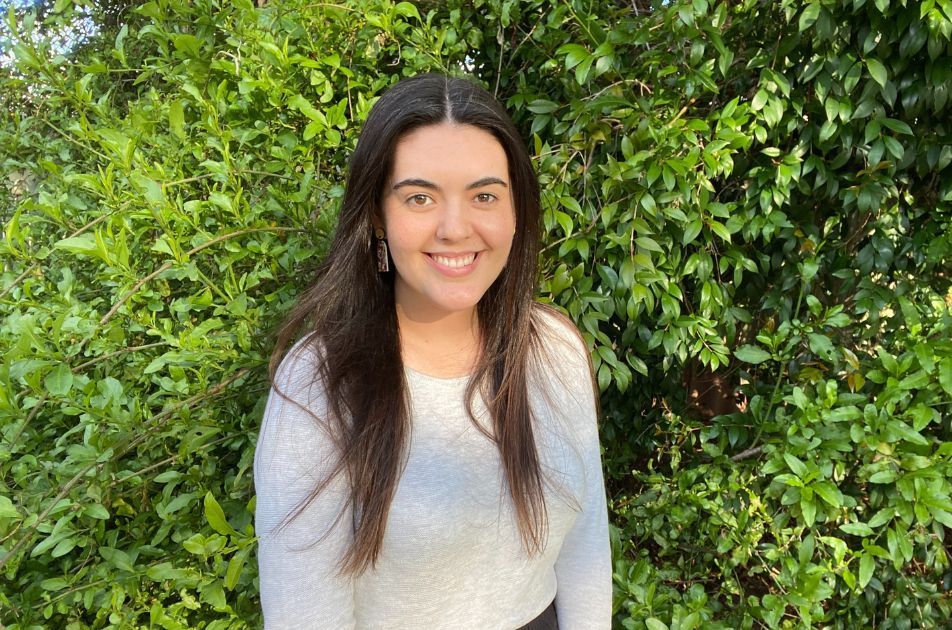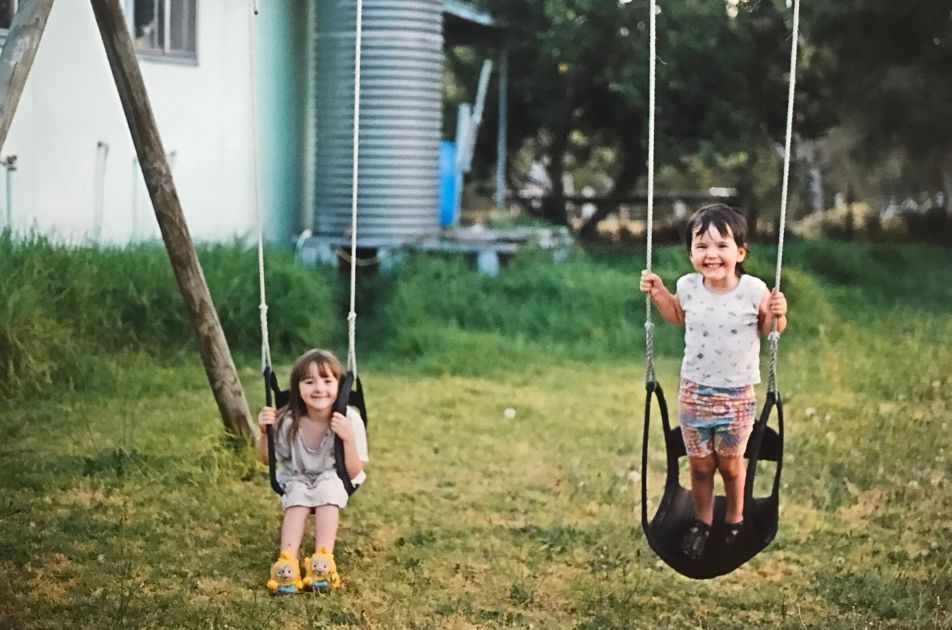Clinical educator at the Curtin Stuttering Clinic Kathy Viljoen, with parents and children from the program.
Author | Carmelle Wilkinson
Imagine you’re at school, running around the playground with your friends.
You have a great idea for the next game, but just as you put your hand up to get everyone’s attention, you clamp up.
The words are on tip of your tongue, but a wave of fear suddenly washes over you.
With your heart racing and your palms getting sweatier by the second, you feel a tightening in your throat as you struggle to speak – silence.
Your friends become agitated and run off, leaving you with feelings of frustration, shame and humiliation.
Sadly, this is a daily struggle for children like Hamish Quekett with a stutter.
Diagnosed at seven, Hamish also lives with autism and ADHD.
“Hamish’s father had a speech impediment growing up and I have ADHD – so we think his condition was inheritable,’’ said Hamish’s mum Louise.
“He was also a late talker, and at one point we thought maybe he couldn’t hear us because he rarely responded when we called him.
“When Hamish did start to talk around three years of age, even though we noticed a slight stutter, we were just so happy he was talking at all.”

Louise and Hamish Quekett.
Despite these early warning signs, Louise said it wasn’t until Hamish was in Year 3 that his stutter was diagnosed.
“His teachers would often tell me not to worry and that he would grow out of it, and to be honest the stutter wasn’t his biggest challenge so I myself didn’t stress about it,’’ she said.
“Talking was a huge chore for Hamish and school became a nightmare for him. It got so bad that he could barely communicate some days.”
Louise said Hamish’s stutter affected all areas of his life, but school was where it really took its toll.
“His stuttering affected his friendships, and he became a target for bullies because he had problems communicating,’’ she said.
“Eventually, Hamish just stopped participating in school.”
Thankfully, a recommendation by a former speech therapist led Louise to The Curtin University Stuttering Treatment Clinic (CUSTC).
Clinical educator Kathy Viljoen manages the clinic, supervising speech pathology students to offer both individual and group treatment to people of all ages for the management of stuttering and fluency disorders.
Since joining the program, Hamish is a happier 13-year-old.
“While he still gets nervous and anxious when he talks, for the most part he’s doing so much better socially,’’ Louise said.
“I can’t talk more highly of the Clinic. It has done wonders for Hamish and more than that he loves going there.
“Every Tuesday when I pick him up, he chats to me in the car, something he very rarely did.”
Louise said previous therapy sessions with external speech pathologists proved fruitless and would often result in Hamish walking out on the first session.
“After his first session with the CUSTC he told me Mum that was fun. I almost fainted,’’ she said.
“I can’t thank the staff enough. They are amazing, they make the time to really talk and listen to the children, and Hamish has even made some friends.
“Their teachings are so simple yet, so effective and they work on building the child’s confidence and self-esteem too.
“It’s a very holistic approach which I love.”
Julia Robinson said the Clinic had given her son Harvey hope.

Julia Robinson said her son Harvey had showed remarkable progress since starting the program.
“It’s been amazing for him. They really go above and beyond to help the children thrive,’’ she said.
“Harvey loves attending and uses the techniques learned on his own.
“He is quite resilient and doesn’t let his stutter stop him at all. But on a particularly distressing day he will stop mid-sentence and say, ‘don’t worry’ and gives up.
“This breaks my heart.”
In Australia, stuttering affects more than 1 in 100 and can affect anyone.
However, it usually starts in childhood, between the ages of about two and four, when language skills are being developed.
Curtin PhD student Rachel Michael said the disorder disrupts the way a person speaks.

Curtin PhD Speech Pathology student Rachel Michael.
Those with a stutter might repeat sounds (c-c-can), syllables (da-da-daddy), words (and-and-and) or phrases (I want-I want-I want).
They may also stretch out the sounds in words (caaaaan I go) or make no sound at all (called a ‘block’) when they try to speak but no sound comes out.
Thanks to a generous donor who struggled with a stutter throughout her life, Rachel was gifted a scholarship to explore the lack of support for school-aged children who stutter.
“I’m so grateful to have met my donor and thanked her personally,” she said.
“Hearing how stuttering had impacted her life, has made my work in this area so much more real and purposeful.
“The support from the scholarship alleviates financial stress and allows me to focus on my research, rather than seek out additional clinical work.”
Internationally renowned stuttering expert Associate Professor Janet Beilby, who established the CUSTC, alongside parenting expert Associate Professor Trevor Mazzucchelli and researcher and lecturer Dr Neville Hennessey comprise Rachel’s supervisory team.
Her research, titled ‘Fluency and Psychosocial Sequelae in School-aged Children who Stutter’, will investigate holistic, family-focused treatment options to help support children who stutter – who are at greater risk of negative peer reactions, rejection and bullying.
Rachel said having watched a loved one get bullied at school she was all too familiar with the pain and frustration this can bring to the child and their family.
“It saddens me to know that children are being picked on at school for a stutter and through my research I hope to empower these children and provide them the tools to communicate with confidence,’’ she said.
“Stuttering can involve avoidance of particularly difficult words and phrases, which in turn hinders one’s ability to express themselves freely and restricts participation, particularly socially and vocationally.
“For instance, if someone dreamed of being a teacher, or a lawyer, they may give up that dream to pursue something else that requires little interaction with people due to difficulty speaking and negative responses of those around them.”
Born in the coastal town of Albany, Rachel spent her childhood years helping on the family’s 22-acre hobby farm.

Rachel (right) with her older sister Sarah hanging out on their farm in Albany.
While a country girl at heart, Rachel never gravitated toward Agriculture, instead taking great interest in Science and English.
“Following year 12 I was drawn to Speech Pathology, because it combined these two interests,’’ she said.
“It wasn’t long into my studies at Curtin that I started to get incredibly excited and passionate about it.
“Researchers have learned a lot about stuttering in recent years, yet there are still so many unknowns to investigate,’’ she said.
“We don’t have a miracle cure for stuttering, but we do know that early treatment is an integral part of preventing widespread negative impact in adulthood – which often affects multiple life areas, including work, social communication and interpersonal relationships.”
Rachel said a common misconception about stuttering was that it is the result of someone being nervous and shy and was something that would go away on its own.
“Unfortunately, this isn’t true,’’ she said.
“Stuttering occurs when there is a difficulty with the brain processes that control speech in the presence of environmental demands and if treated early, we know children have a high chance of recovering.
“This is because there is a greater degree of neuroplasticity when people are young. As we get older neuroplasticity decreases, and treatment influences the brain’s development to a much lesser extent.”
Through her research, Rachel will study the prevalence of significant psychosocial effects on primary school-aged children who stutter.
She will also explore speech fluency training combined with additional family-focused intervention strategies to help school-aged children who stutter to communicate clearly and confidently.
“Stuttering isn’t well understood in the community,’’ she said.
“As part of my research I’d like to get the word out about stuttering and continue equipping people like educators and parents, because everyone has the best interest of these kids at heart and wants to help.
“But perhaps at times we just don’t have the required information in order to do so.”
Author | Carmelle Wilkinson
___



